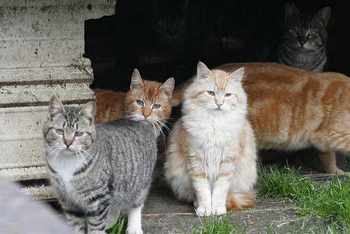Life and Times – stray cats and gundog rescue
 Every month at least half-a-dozen letters from animal charities come through my letter box. They’re asking for donations in one form or another. It’s my own fault. I’m tempted to throw them in the bin but usually end up sending a small amount of money or buying a book of their raffle tickets.
Every month at least half-a-dozen letters from animal charities come through my letter box. They’re asking for donations in one form or another. It’s my own fault. I’m tempted to throw them in the bin but usually end up sending a small amount of money or buying a book of their raffle tickets.
Save the animals
As an example, for a long time I’ve been paying a few pounds a year to ‘adopt’ a pony from the Bolenowe Animal Sanctuary in Cornwall. I receive a new ‘Certificate of Adoption’ from them every year. Then I make a small monthly direct debit payment to Cats’ Protection and to the Donkey Sanctuary and I usually spend £10 buying a book of the raffle tickets I receive from other organisations such as the Dogs’ Trust, the International Fund for Animal Welfare (IFAW) and People for the Ethical Treatment of Animals (PETA). In particular I give regularly to an organisation local to me called the Woodfield Animal Sanctuary. It was set up a number of years ago by a retired couple who put all their pension income into buying a piece of land on the Gower Peninsula to rescue and look after all types of stray animals – sheep, goats, cows, horses, dogs, cats and just about everything else. They’re supported in what they do by a dedicated team of volunteers and struggle against massive odds to cope with weather, building upkeep and the sheer volume of animals needing to be looked after. Some of their reports are heart-rending, but also heart-warming, and at the moment their Facebook page tells us they’re competing with dozens of other charities (Perthshire Gundog Rescue, Stray Cats Rescue Team West Midlands, Save Our Spaniels, Holly Edge Animal Sanctuary, Dogs4Rescue, etc) for a share in a £300,000 sum being dispensed by MyGivingCircle.org. The money is available to those charities that get the most votes from people as being most worth supporting. So Woodfield are sending regular messages to their own supporters encouraging them to vote in their favour so that they’ll get funding they’re desperate for.
Can’t pay, can’t have
Of course, animal charities are just a tiny proportion of the countless others that try their best to raise money for their causes. A short time ago this column focused on homelessness and the work of Shelter, an organisation set up in the 1960s with the avowed aim of solving the UK’s homeless problem within 10 years. In the event it’s still going strong today and in fact exists now side by side with other similar concerns, and competing for funds with them. Homelessness has remained endemic and that will almost certainly continue for as long as we have a system (ie, capitalism) whose accepted norm is ‘if you can’t pay you can’t have’. As everyone knows, for accommodation, as for other vital things, money is necessary or you go without. That is what is fundamental to the system we live under today, wherever in the world we happen to be.
And what is also fundamental is the need it throws up for charities seeking to mitigate the consequences of ‘can’t pay can’t have’. While it’s true that these charities can never do more than paper over the cracks produced at all levels by the inequality inherent in the buying and selling system, it’s also true that they undoubtedly help a lot of people – and a lot of animals – to survive rather than just go under. In this sense we can say that charities are necessary in an uncharitable society, which, by its very nature, is what capitalism is. At the same time charities do not actually solve the problems they engage with – nor can they ever hope to.
The best cause
But this will not stop me from giving amounts of money I feel I can afford to particular ‘good causes’ or from supporting them in other ways. But I’ll be doing so under no illusion that the problem they exist for can be solved by them. And I’ll also be doing it in the knowledge that the very best ‘cause’, the most worthwhile one, is the socialist cause. What I mean by this is that, only when the cause of establishing a cooperative world society of voluntary work and free access, without buying and selling and without money and wages, becomes the first priority of workers everywhere, will we see the only lasting solution to the manifold and never-ending problems that the current system throws up.
 So while the humanity, dedication and sheer well-meaningness of the volunteers of the Woodfield Animal Sanctuary, Shelter and many other charities is to be applauded and respected, their efforts can never achieve a remedy to the problems they exist to address. That’s because a social and economic system dedicated to producing profit for the tiny minority is simply not designed to cater for the needs of the majority, let alone for the most deprived members of that majority or for the welfare of animals. Think of the difference it would make if only a small part of all the time, energy and resources people throw into charitable work to try and make a small difference within this system were directed into achieving a society where charity was no longer necessary. How much closer that would bring us to establishing such a society.
So while the humanity, dedication and sheer well-meaningness of the volunteers of the Woodfield Animal Sanctuary, Shelter and many other charities is to be applauded and respected, their efforts can never achieve a remedy to the problems they exist to address. That’s because a social and economic system dedicated to producing profit for the tiny minority is simply not designed to cater for the needs of the majority, let alone for the most deprived members of that majority or for the welfare of animals. Think of the difference it would make if only a small part of all the time, energy and resources people throw into charitable work to try and make a small difference within this system were directed into achieving a society where charity was no longer necessary. How much closer that would bring us to establishing such a society.
HOWARD MOSS
2 Replies to “Life and Times – stray cats and gundog rescue”
Leave a Reply
You must be logged in to post a comment.

Excellent article.
Excellent front cover.